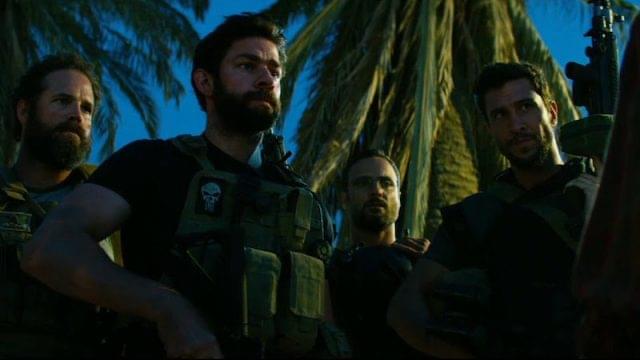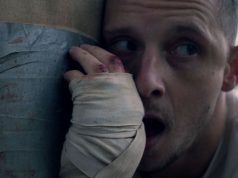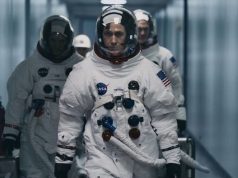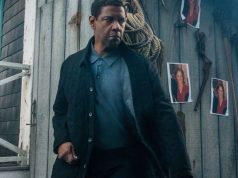
Michael Bay hasn’t directed many movies that were good, but he’s directed even fewer that were political (chanting “USA! USA!” isn’t the same as being political). So we shouldn’t be surprised that “13 Hours,” Bay’s movie about the Benghazi attacks of 2012, is far more interested in the bullets, bombs, and bodies of the affair than it is in the hearings and investigations that followed it. The whole subject may be politically charged, but don’t forget: Michael Bay is first and foremost a dumb guy.
This is one of his better films, actually, a fairly mature and level-headed combat drama that follows a well-worn path with smooth confidence. Adapted by Chuck Hogan from Mitchell Zuckoff’s book, “13 Hours” isn’t burdened with the cheesy dialogue and moronic humor that have plagued so many Bayopics, and the director’s other usual excesses are reined in. Oh, there are blood-spraying head-shots, and bodies being run over by cars (Bay likes that), and a “Pearl Harbor”-ish moment where we follow the bomb’s point of view as it descends on a target (always a favorite). But in general, Bay seems serious about telling an intense, fact-based story along the lines of “Zero Dark Thirty,” albeit without that film’s level of tension and gravitas.
We arrive in Benghazi, Libya, with Jack Da Silva (John Krasinski), a Navy SEAL now working with other ex-military as security contractors for the CIA, which has a secret base in the city. A mile away is an American “temporary diplomatic outpost” — not an official embassy, crucially, or it would have tighter security — where the U.S. ambassador to Libya, Chris Stevens (Matt Letscher), is due to visit from Tripoli.
At this point, Benghazi is one of the most dangerous places in the world. The post-Gaddafi government is opposed by rebel forces (the bad guys), which are in turn opposed by a militia called the February 17th Martyrs Brigade (the good guys). The trouble, as Jack’s fellow SEAL Tyrone “Rone” Woods (James Badge Dale) explains, is that “not only is hot as balls, you can’t tell the good guys from the bad guys.” They’re all Libyan and heavily armed, and it’s not like they wear uniforms.
Jack, Rone, and the other members of the Global Response Staff (as they are called) may have difficulty knowing who can be trusted, but the movie makes sure we know who can’t: the wormy, cowardly CIA chief (Dave Costabile) in charge of the base. His first action in the movie is to deny Jack and Rone support during a scuffle with locals because he insists on keeping a low profile. Then there’s his declaration that “there is no real threat” in Benghazi (a line engineered to make us howl at his shortsightedness), plus an overall reluctance to get involved in anything. Also, in a movie full of buff guys, he’s doughy. Bro doesn’t even lift.
When the not-an-embassy is overrun by a mob, the G.R.S. guys are eager to lend a hand but are hindered by the Chief’s dithering and the thick, sticky bureaucracy of having a secret CIA base. (If they rush over to help, it will be hard to keep pretending the CIA base doesn’t exist.) Secrecy is eventually a moot point, and the question becomes whether the U.S. can send help that will a) arrive in time to be helpful and b) not start a war. The issue of how (or whether) to send backup during the attack has of course been the subject of much scrutiny in the three years since it happened, but Bay doesn’t blame an agenda, a conspiracy, or even incompetence for the four American deaths. His theory seems to be, “Hey, red tape and protocol, whaddaya gonna do?” (In case you were wondering, Hillary Clinton is never mentioned.)
The combat sequences deliver what they’re supposed to, hindered only a little by Bay’s patented Confuse-O-Vision® shaky-cam technology, and helped considerably by the camaraderie among the men (who call each other “brother” and seem to mean it). Besides Jack and Rone, there’s smart-aleck Tanto (Pablo Schreiber), philosophical Boon (David Denman), indestructible Oz (Max Martini), and Tig (Dominic Fumusa), whose personality trait I didn’t catch but who seems valuable to the team. Their downtime conversations ring true, and the montage of their Skype and FaceTime calls back home to their families is just the right level of sappy.
Like a lot of war movies, this one doesn’t have a purpose beyond thrilling us with bloody combat and brave heroism, no themes deeper than “we have to kill the bad guys when they attack us.” That may be why, for as engaging as it is, it’s never emotionally stirring in the way that the great war movies are, nor does it give the sense that this battle had any long-term significance. It’s a good, ordinary movie about a very bad day.
B (2 hrs., 24 min.; )





